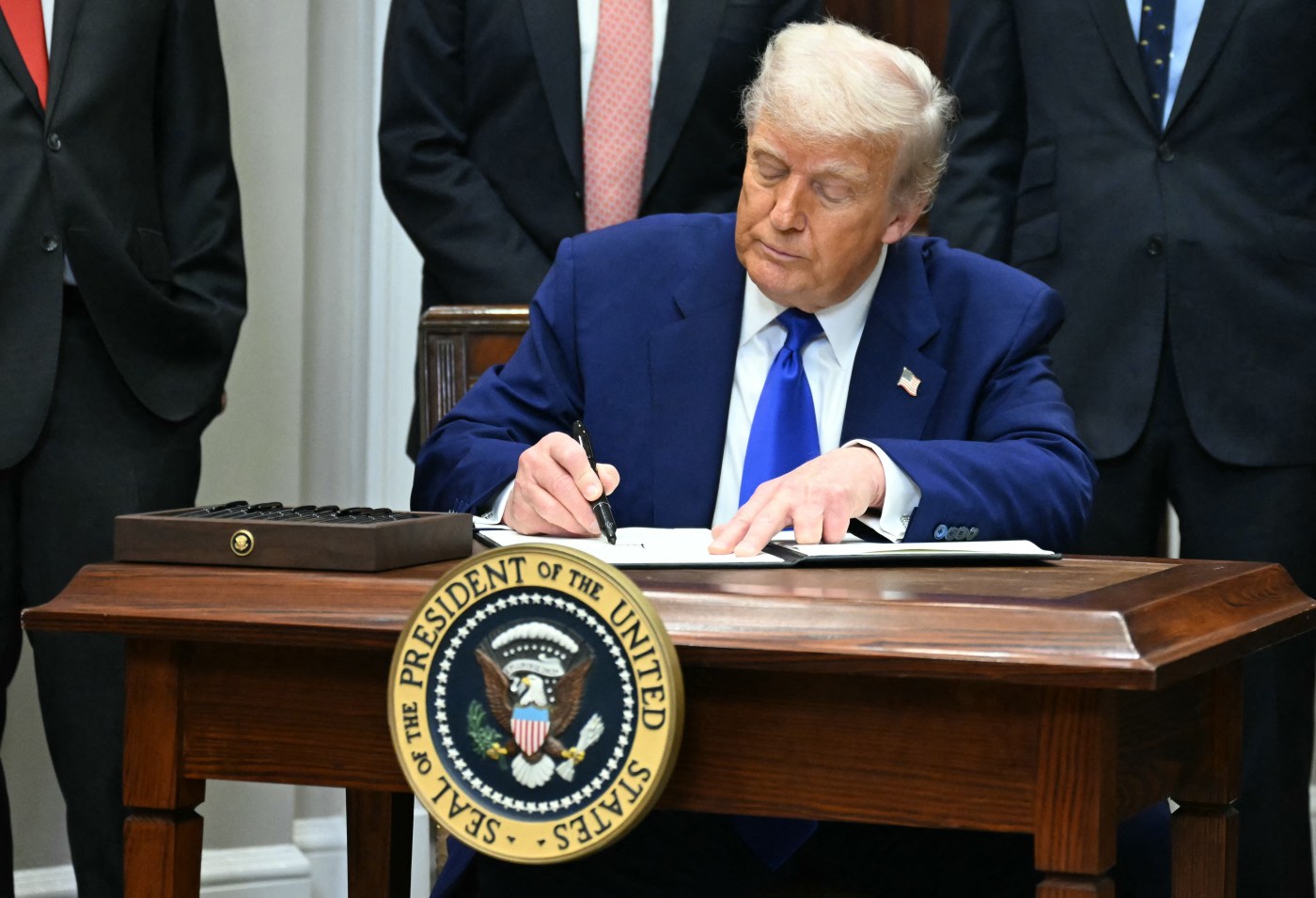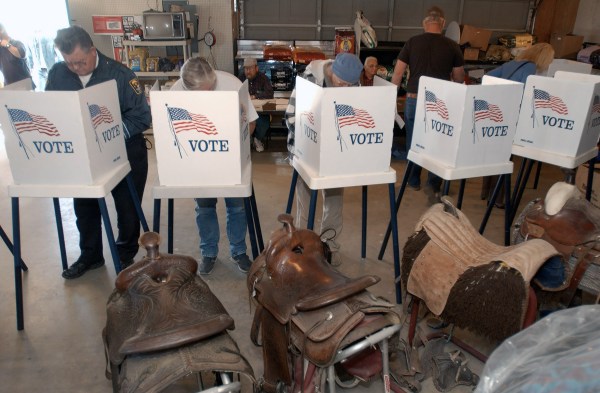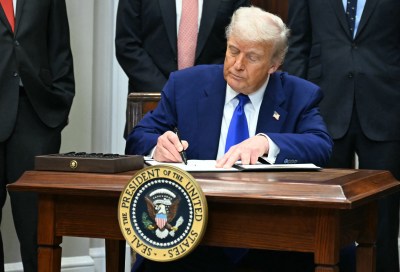Turn any article into a podcast. Upgrade now to start listening.
Premium Members can share articles with friends & family to bypass the paywall.
Given that Donald Trump is a borderline illiterate, he has chosen a strange strategy as president: being a writer.
He is a writer of “executive orders,” many of them press releases disguised as diktats. He is a writer of memos and tweets and presidential statements. I mean that he is a writer of these in the same way he is the writer who wrote The Art of the Deal—which is to say, he didn’t write the thing, but it is, in a broader sense, his work.
And the thing about work is, Trump does not like it.
Post-election politics and substantive policymaking—distinct but related activities—require a lot of boring, labor-intensive, grinding work. The really hard part of politics starts after Election Day, and there have always been grinders to be found among the great American politicians qua politicians: James Madison, Lyndon Johnson, Sam Rayburn, Arthur Vandenberg. Sen. Vandenberg may be best remembered for a speech—“The Speech Heard ’Round the World”—but his achievement was in putting that speech into effect by remaking the domestic political landscape of American foreign policy, dragging the GOP out of its isolationist bunker in the face of World War II.
President Trump doesn’t really do politics—because he is, in fact, utterly incompetent at negotiation, which is why he spends so much time insisting that he is a master of the art. Trump mainly does politics only in those areas where he can operate without much, or any, negotiation: in making appointments, of course, and in doing all that writing that has not and will not amount to much of anything.
Why write?
There’s a view of criminal justice reform that holds that the best way to dissuade criminals is by increasing the likelihood, rather than the severity, of punishment. For example, some jurisdictions have increased the criminal penalties for low-level firearms trafficking by “straw buyers,” but this is likely to have little effect, since we rarely prosecute such cases at all—a 10-year sentence that a criminal is almost certain to avoid is no more of a deterrent than a five-year sentence that a criminal is almost certain to avoid. On the other hand, a one-year sentence that a criminal is likely to serve probably would be much more effective as a deterrent than a 10-year sentence the offender would escape 99.9 times out of 100.
Signaling matters—but only when it is backed by something stronger than the signal itself.
The most charitable view one could take of the Trump administration’s crypto-Leninist central planning—his low-energy autocracy consisting of lots of easy-to-publish executive orders amounting in the long run to approximately squat, little in the way of more durable reform fortified by actual legislation—is that it is a signaling strategy. That works both ways: Tell the markets you intend to follow a daffy economic policy of chaotic quasi-autarky and they just may take you seriously enough to crash; tell the markets that you’re having second thoughts about economically hitting yourself with a ballpeen hammer in the body parts that are right there in the name of the instrument, and they may bounce back.
Signaling can be especially useful in deterring crime: Before he was the gin-ruined and servile grotesque he is today, Rudy Giuliani was the famously competent mayor of New York City, whose administration coincided with a dramatic reduction in crime—not because the authorities successfully locked up all of the urban malefactors, but because the administration signaled that it was willing to go to greater lengths to lock them up than its predecessors had been. Donald Trump’s hawkish rhetoric about border control and illegal immigration probably is the reason (or at least a considerable part of it) for the recent decline in attempted illegal border crossings. Entering the United States illegally is a lot more tempting if you believe that you are unlikely to pay any price for it, and heavy penalties provide little deterrence if they are seldom imposed.
But there is only so much you can do with signaling. Trump’s batty international price-fixing scheme for pharmaceuticals (remember when the dirty socialists wanted to regulate drug prices only in only one country? Nikolai Bukharin lacked vision!) is, shorn of its pretense, basically a pleading missive to the drug companies expressing Trump’s preference for lower prices vis-à-vis Bulgaria or Serbia or wherever it is that Trump’s going to go to recruit his next wife. There’s no mechanism for making anything happen. And so nothing is going to happen. Sure, signals matter—but money talks, too, and what Donald Trump is hearing from the coffers of the world’s pharmaceutical companies is ... not printable in this space.
Trump may bluster and pound the table, but he isn’t the only signal-sender. Bond markets and credit-rating agencies do not respond that much to the present fiscal situation of the United States as much as to their expectations about where federal spending and debt are going—to the signal, in this case, a particularly loud one. One big credit-rating agency just downgraded Washington’s debt a step down from AAA, and that is a signal, too, one that Donald Trump is going to ignore: He long had one of the worst credit profiles of any supposed billionaire walking the Earth, and apparently found it difficult to get credit from the big New York banks, which are not, in spite of what sometimes seems to be the case, run by orangutans. Credit ratings—for people and states—are important signals.
I recommend that people listen to Donald Trump when he speaks. What you will hear is a brief for central planning, for a program of economic regimentation and political domination that would be denounced as socialism by every Republican within 20 miles of a Fox News microphone were it coming from a Democrat.
But Trump rarely gets as far as Lenin in asking, in practical terms: What Is to Be Done? Lenin was a monster, but he also was a world-shaper. Trump is a monster and a social-media troll. He is different from crackpot authors of Facebook manifestos in that Americans will from time to time be obliged to visit a federal court to vacate his nonsense, but his approach remains fundamentally passive: He is not a driver of world events but a commentator on them. A commentator can shake the fundament from time to time—Martin Luther did. But Trump is not The Man in the Arena, however much he may protest and as strange as it is to write of a man who not only serves as president of these United States but who also is the central political figure in the world today. He would like you to believe he is in the thick of it, which is why, for example, he falsely claimed to have had a hand in the India-Pakistan ceasefire, which was news in Delhi and Islamabad. That’s the first rule of rainmaking: When it rains, start dancing. Remember Trump’s first reaction to COVID—trying to talk up the markets and insisting, as though his insistence were supernaturally efficacious, that the whole thing would blow over in a week or two. Think of how differently that episode might have gone with an actual executive in charge rather than a half-literate would-be pundit.
But, again, that would be work. And Trump is lazy, preferring the illusion of action to action itself. Trump prefers to simply list his preferences, as though he were choosing from the dollar menu at McDonald’s or shooting the breeze in front of a Fox News broadcast in some bingo hall in Smackover, Arkansas. He dreams of managing the country as though it were one big department store, but Trump has never run a department store and couldn’t on his best day make a competent manager of a Neiman Marcus or a suburban outlet mall, both of those being genuinely complex businesses.
Trump doesn’t run the country. He runs his mouth.







Please note that we at The Dispatch hold ourselves, our work, and our commenters to a higher standard than other places on the internet. We welcome comments that foster genuine debate or discussion—including comments critical of us or our work—but responses that include ad hominem attacks on fellow Dispatch members or are intended to stoke fear and anger may be moderated.
With your membership, you only have the ability to comment on The Morning Dispatch articles. Consider upgrading to join the conversation everywhere.